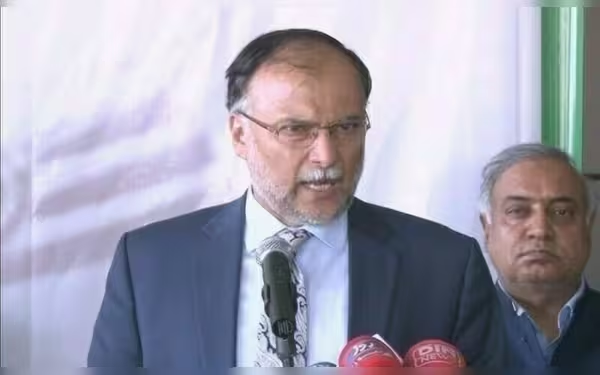Saturday, November 16, 2024 07:24 PM
Ahsan Iqbal Advocates National Urban Planning Framework for Safer Cities
- Minister calls for collaboration between federal and provincial governments.
- Framework aims to tackle urban challenges and improve quality of life.
- Focus on sustainable development and climate resilience in urban planning.
 Image Credits: brecorder
Image Credits: brecorderAhsan Iqbal emphasizes the need for a National Urban Planning Framework to create safer, sustainable cities in Pakistan.
In recent years, urbanization has become a significant challenge for many countries, including Pakistan. As cities grow rapidly, they face numerous issues such as environmental pollution, housing shortages, and inefficient land use. Recognizing these challenges, the Federal Minister for Planning, Development, and Special Initiatives, Ahsan Iqbal, has called for a comprehensive approach to urban planning through the National Urban Planning Framework. This initiative aims to create safer, more resilient, and livable cities across the nation.
During a meeting held in Islamabad, Minister Ahsan Iqbal emphasized the need for greater collaboration between federal and provincial governments. He directed relevant agencies to develop a sustainable urban planning framework that could serve as a model for other provinces. The goal is to transform Pakistan’s major cities into engines of economic growth, which is crucial for the country’s overall development.
The minister pointed out that urban challenges are not just about infrastructure; they also involve improving the quality of life for residents. He highlighted the importance of addressing environmental pollution, which affects health and well-being, and the urgent need to tackle housing shortages that leave many without adequate shelter. Additionally, he stressed the importance of efficient land use to prevent the degradation of urban life.
One of the key aspects of the National Urban Planning Framework is enhancing urban transportation systems. Ahsan Iqbal noted that providing adequate facilities for pedestrians and cyclists is essential for making cities more environmentally friendly and youth-centric. This approach not only promotes a healthier lifestyle but also reduces traffic congestion and pollution.
The framework aims to ensure that urban centers in Pakistan become “livable cities” that support sustainable development. This means effective governance, modern urban planning, and efficient mass transit systems are all part of the plan. The minister also pointed out the importance of security in urban areas, which is vital for attracting investment and ensuring the safety of residents.
As urbanization continues to rise, with 54 percent of Pakistan’s urban population living in just 21 major cities, the need for improved land management and zoning becomes increasingly critical. Ahsan Iqbal urged the prevention of fertile agricultural land from being converted into housing schemes, emphasizing the need for comprehensive policies to protect these vital resources.
Moreover, integrating climate adaptation and mitigation measures into urban planning is essential to safeguard cities from climate-induced threats. This proactive approach will help ensure that urban areas are not only prepared for current challenges but are also resilient against future risks.
The National Urban Planning Framework represents a significant step towards addressing the pressing urban challenges faced by Pakistan. By fostering collaboration between different levels of government and focusing on sustainable development, the framework aims to create cities that are not only economically vibrant but also safe and livable for all residents. As urbanization continues to shape the landscape of Pakistan, it is crucial for policymakers to prioritize effective urban planning to ensure a better quality of life for future generations.













